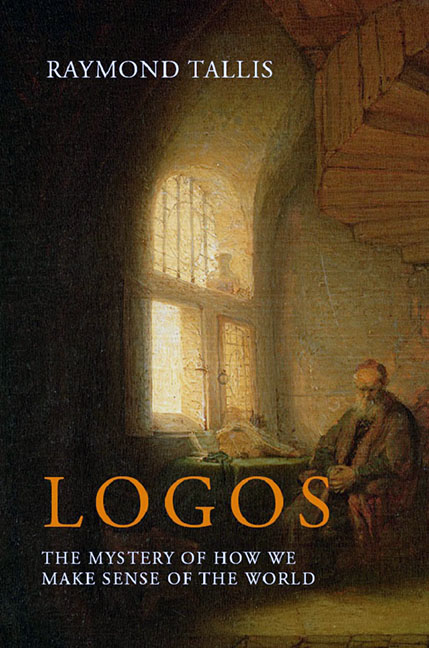Book contents
- Frontmatter
- Dedication
- Contents
- Acknowledgements
- Preface
- Overture
- 1 Seeing the sense-making animal
- 2 Logos: a brief backward glance
- 3 Deflating the mystery 1: putting the world inside the mind
- 4 Deflating the mystery 2: logos as bio-logos
- 5 The escape from subjectivity
- 6 Thatter: knowledge
- 7 Senselessness at the heart of sense
- 8 Towards a complete comprehension of the world?
- Coda
- Notes
- References
- Index
Preface
Published online by Cambridge University Press: 09 August 2023
- Frontmatter
- Dedication
- Contents
- Acknowledgements
- Preface
- Overture
- 1 Seeing the sense-making animal
- 2 Logos: a brief backward glance
- 3 Deflating the mystery 1: putting the world inside the mind
- 4 Deflating the mystery 2: logos as bio-logos
- 5 The escape from subjectivity
- 6 Thatter: knowledge
- 7 Senselessness at the heart of sense
- 8 Towards a complete comprehension of the world?
- Coda
- Notes
- References
- Index
Summary
[A] philosopher worthy of the name has never said more than a single thing: and even then, it is something he has tried to say, rather than actually said.
Henri Bergson, Address to the Fourth International Congress of Philosophy, Bologna, 1911The inquiry that follows is a philosophical homecoming. At any rate, it is an attempt to return to the place whence I set out in my teens, dozens of published books, and many more dozens of unpublished manuscripts, ago.
My philosophical awakening was shaped by fears. Some were well-founded, such as that sooner or later I, and everyone I cared for, would die in pain and terror. Other fears were equally commonplace but less well-founded: that my freedom was illusory; and that the world as I experienced it might be a dream. These philosophical concerns were, a few years later, offset by something quite different: an overwhelming astonishment that I existed, that I could think that I existed; that I could make everyday sense of myself and my world; in short, that there is “that”. It was accompanied by an unexpected joy that I still cannot fully explain although I am grateful for it.
One moment I have recalled so frequently that not one detail will have survived undistorted. As I remember it now, I am standing in a little attic room, fragrant with cabbage soup and the fishy smell of a malfunctioning anglepoise lamp. These were my student digs: 60 Park Town Crescent, Oxford, where I was lodged with Mrs Pasternak-Slater, the exiled sister of Boris. I am talking to my friend Chris Verity, then a medical student and now a retired consultant. I can't remember what we were talking about. Suddenly I heard my own voice and, beyond my voice, the “that” implicit in it – located somewhere between “that I am”, “that x is the case”, “that the world exists” and “that I am making sense of something”. Thus, my encounter with “thatter”. “Mystery” is, perhaps, too narrow a word; rather a revelation tinged with surprise, feeling itself to be on the threshold of a further revelation that in the subsequent fifty or more years has not revealed itself.
- Type
- Chapter
- Information
- LogosThe Mystery of How We Make Sense of the World, pp. xi - xivPublisher: Agenda PublishingPrint publication year: 2018

